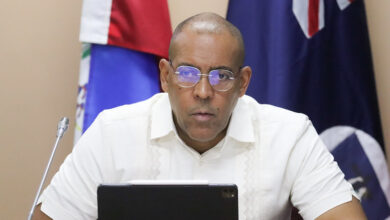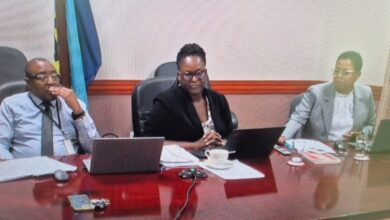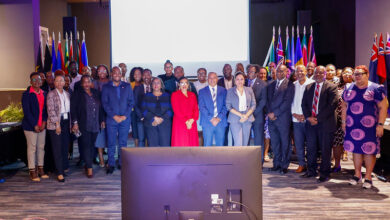A warm welcome to my colleague Ministers of Agriculture and officials here for the 27th Special Ministerial Meeting of the Council for Trade and Economic Development. I hope that your stay in Guyana will be enjoyable, but more importantly that our deliberations will be successful.
When this meeting was planned, I insisted on an agenda with a reduced number of items and a greater and more intense focus on current issues such as food prices. CARICOM readily agreed. We all share the view that a more focused agenda is needed so that we could be much more action-oriented and achieve the intended concrete results.
This agricultural COTED is about coming together, discussing problems and finding practical solutions to a global problem – escalating food prices – which has serious economic, political and social implications. It is about arriving at tangible outcomes to address the urgent imperative demanded by the most central concern facing our peoples at this time.
Countries around the world face new and serious economic, political and social challenges brought on by the rapid increase in food prices brought on by a combination of factors not within the control of any of our Governments. The Caribbean region is not immune from these challenges. The need to provide adequate and affordable food requires timely and effective responses from us all, and these meetings should be the means through which we coordinate our response and convert talk into speedy action and workable solutions.
As a late great US President John F. Kennedy said ‘there are risks and costs to a programme of action. But they are far less than the long-range risks and costs of comfortable inaction’.
I would like us to carefully consider why we are meeting today, and what we would like to achieve from this special meeting of COTED. It certainly should not be to remind us of what we have not achieved.
I feel it is extremely important that this meeting be oriented towards action. I also believe that we should seek to encourage our people to become more engaged in our programmes to confront the region’s dilemma of low food production and high prices. In this regard, I would like to propose that emerging from this meeting should be a number of outputs, including:
– a specific plan of action with a timeline and assigned responsibilities for activities
· an agreed mechanism to allow easy access to each other’s markets in the short- term without compromising plant and animal health controls and regulations.
· meaningful cooperation and sharing of experiences and resources
· a renewed commitment to regional programmes, and the maintenance of the CET so as not to threaten existing agricultural activities by importing highly-subsidized produce
· a commitment from the CARICOM Secretariat and lead agencies to be more accountable in the implementation of regional initiatives
Mr. Chairman, The CARICOM food bill today exceeds the last estimate of US$3.5 billion annually. This will climb higher if we sustain our dependence on imported food. With rising food prices expected to prevail for at least the medium term, we as a Region must ensure that we are both food secure and food sovereign. Food sovereignty implies that feeding our people is regional and national responsibility. If the people of any member State must depend for their next meal on the vagaries of the global economy, or on the unpredictability and high cost of long-distance shipping, that country will not be secure in terms of its responsibilities to its people or in the sense of being able to adequately provide food for all its people.
I wish to add that even if it is currently cheaper to import food out the region rather than grow it locally, the unpredictability of future global food prices and the uncertainty over supplies means that if the Caribbean is to achieve real food security and food sovereignty, we must increase local food production and encourage consumption of what we produce.
We must also begin to envision the Region as not just an amalgam of small economies but as a single unit with a united vision in dealing with the situation that affects us. We can only achieve this shared vision of food sovereignty through a coherent and coordinated response in meetings such as this.
Guyana and many other countries of Region have taken steps to cushion the impact. But no country can successfully do it alone. There are a number of ongoing initiatives to increase agricultural production in the region, including addressing the binding constraints as contained in the Jagdeo Initiative. The Jagdeo Initiative is an extremely important framework within which to achieve our agricultural potential. I would like to suggest that this is not the time to reinvent the framework which has gone through a process of consultation and refinement. This is the time to recommit to the Initiative and find ways to accelerate its implementation.
One mechanism that can assist is the establishment of a Management Advisory Committee for each of the binding constraints, with the Lead Country Minister and his/her Permanent Secretary given more responsibility for ensuring that necessary actions are taken.
The Common External Tariff is also an important means through which we can develop competitive industries and ensure regional food security. We must guard against reducing tariffs to the point where we erode their effectiveness. We must bear in the mind the legitimate reasons for these tariffs. We should also see the CET as a means of boosting trade between our Member States. Waivers of the CET should only be granted in extreme cases.
Mr. Chairman,
Several initiatives were agreed upon by the CARICOM Heads of Government on the 12th special meeting of the Conference of Heads of Government of the Caribbean Community in December of 2007. These measures were meant to be instituted immediately to cushion the impact of rising food prices and ensure the adequate supply and distribution of food intra-regionally. It worries me that many of these measures which were decided upon nearly six months ago have still not been implemented. For example, the expert CARICOM Team on SPS has still not been established.
We appreciate the problems associated with coordinating activities in a large number of countries. We, however, need to look at the issue of why it is that directives from the Heads of Government are not being implemented. The CARICOM Secretariat needs to steer and lead this process and if it is unable to do this perhaps it is time to review the mechanisms within the CARICOM Secretariat. In fact, you would agree with me when I say that the time has come for us to review how the Secretariat and its lead agencies coordinate agricultural development in order to enhance accountability and ensure that delays in operationalising policy directives do not continue.
It seems to me that the CARICOM Heads of Government, by their decisions, show that they understand the problems facing their constituents. However, I am not convinced that this understanding is shared by all the agencies and technicians tasked with carrying out these decisions. Some do not seem to comprehend the implications of their inaction on the welfare of the people of the region.
The global situation facing us has been referred to by many as an impending crisis. It is time that we take heed of this warning and start acting quickly and effectively to ensure this crisis does not envelop us.
The rapidly changing global environment requires an equally express response. As such, I would urge that we place serious emphasis on accelerating the initiatives already identified even as we search for new solutions for emerging problems.
With His Excellency President Bharrat Jagdeo as CARICOM’s Lead Head of Government with responsibility for agriculture, Guyana is committed to taking a leadership role in the regional response to the food crisis. Our economy is primarily agriculture- based. We have an abundance of arable land and vast reserves of water resources. Guyana has offered its rich agricultural resources to CARICOM in the pursuit of food production, including agro-processing. Locally, we have also launched a Grow More Food campaign not only to ensure adequate food for our own people, but be able to assist in meeting the food needs of the entire region. There is a role for each country and every single citizen of CARICOM region in our Grow More Food effort.
Mr. Chairman,
Guyana is also happy to be collaborating with various stakeholders on the upcoming Agriculture Investment Forum scheduled to be held in Georgetown in the next two weeks. Investment, particularly private sector investment, in the agriculture sector in recent years has been sadly lacking with many countries in the region preferring to focus on services. With agriculture becoming a more profitable enterprise with the changing global reality, we hope to attract serious investors who will enable us to achieve our vision for agriculture in the Caribbean.
Even though rising food prices are pushing up the cost of living, they also provide farmers with an opportunity to increase their income. For example, this is the first time that rice farmers have received such competitive prices for their crop. The prices of non-traditional agriculture crops and livestock are also improving the fortunes of our farmers, and for countries to increase export earnings. This situation, if properly harnessed, can also be an incentive to get our people back to the land.
Before the present food-price spike, President Jagdeo pointed out to an earlier meeting of CARICOM Ministers of Agriculture that ‘a renewed and competitive agriculture sector will not only earn money for this region, but provide the critical food security that we need’. This need has not changed; rather, it has intensified over recent months. As such, we must refocus our efforts to implement the plans we already have laid out for the Jagdeo Initiative.
The people of the region, must know that we are serious about our commitment to fast track the regional drive for realizing our agricultural potential and become food self sufficient. The feeling of a current spell of inaction is unacceptable, especially in light of the current global food price climate.
Colleagues, we must make the commitment here today to turn our words into action.
Once again, welcome to Guyana!
Thank you.





